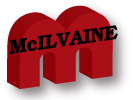
Coronavirus Technology Solutions
September 25, 2020
Industrial Air Filtration Knowledge Can be Used to Fight COVID
Precision Textiles Expanding PPE Output
Ontex Making 80 Million Face Masks per Year in Belgian Factory
Private Equity Group Makes Offer for Ahlstrom Munksjo
Ortner Hygienic Cube Recommended for Meat Processing Plants
Ortner Decontamination of Hotel Rooms
COVID Outbreak at Another Irish Meatpacking Plant
______________________________________________________________________________
Industrial Air Filtration Knowledge Can be Used to Fight COVID
There is a very large market for high efficiency filters and systems to battle COVID. The major driver is the discovery that the COVID virus is largely transmitted in small aerosols. Some of the companies best equipped to pursue this are ones presently involved with fan filter units, in plant dust collection systems, and gas turbine intake systems. These companies already supply high efficiency filters, hoods, and specially designed duct systems. All of these applications can be viewed as just different sequences of hoods, filters, and rooms or space.
There is the potential for fan filter units and local air systems to quickly grow from insignificance to a market size exceeding either gas turbine or in plant dust collector systems.

All these various designs use some sequence of hoods, filters, and rooms

There are three systems which can be classified in this room-filter-room sequence
HVAC Systems: Due to the new evidence that most COVID transmission is via small aerosols there will be a big increase in the market for HVAC filters. The biggest opportunities for the filtration industry are in the filters and media and not the ductwork which is typically furnished by HVAC suppliers. Two exceptions are Johnson Controls and Daikin who are in both segments.
Many HVAC systems will be upgraded from MERV 8 to MERV 16 or even H 13. There are pre filters and static filters as opposed to self-cleaning filters. The system sequence is filtering ambient or room air and then discharging it back into the room.
Fan-Filter Units: To combat COVID there is a new room to filter to room approach involving fan-filter units. Johnson Controls is a supplier of these units. Many of the other suppliers such as Ortner are oriented toward cleanrooms. Static HEPA filters are typically utilized.

Room Air Purifiers: This is a booming market and is served by large companies such as Honeywell and Mitsubishi as well as many specialized companies.

Local Dust Collection System: There is a big industrial filtration market using the hood-filter-room sequence. Companies such as Donaldson, Nederman and CECO have unique hoods and ducting to capture welding smoke or dust from local operations in hoods and then supply the ductwork to a filter. If the exhaust is going to be discharged back to the room H-13 or higher efficiency is needed. If the air is going to be discharged outside then the MERV 16 equivalent would be acceptable. Generally, these are self-cleaning filters.

Turbine and Compressor Intake Systems: Some of the same companies (Dakin, Nederman and Donaldson) have gas turbine large compressor inlet filter systems. Room or ambient air is sucked in through a hooding arrangement and then filtered in the gas turbine inlet. Filter companies often supply the intake hooding as well as the filters. The trend has been to upgrade to MERV 16 or H-13 to protect the turbine. Both static and self-cleaning filters are utilized.

Local Air Purification Systems: There will be a very big market for what is the reverse design of the local dust collection system. Room air is filtered and discharged above a meat packer, diner or an airline passenger. HEPA filters are utilized and are typically static. Meat processing plants have been installing partitions. Instead there should be a continuous stream of downward purified air. The partitions cause turbulence. Think in terms of a perfume factory where partitions would not reduce the odor but purified air passing through the breathing zone would eliminate the odor for the individual.
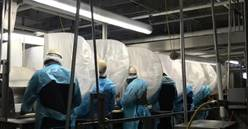
The airlines have a system designed so that clean filtered air is delivered through an adjustable nozzle above each passenger. The air flows down around the breathing zone and then into the baggage compartment below.
There could be separate fan-filter units as per the checkout counter picture above. But it can also be a ceiling system as per this Blue Sky film studio example.
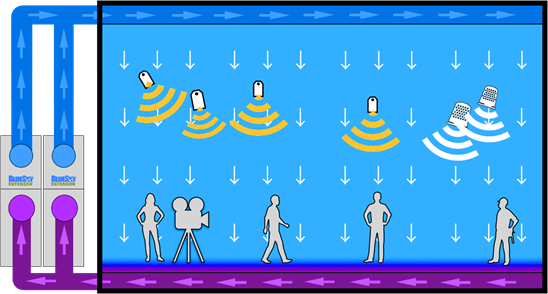
This can be an expensive approach. If the goal is just to have purified air flowing downward around people who are stationary e.g. meat processors, a central filter system and discharge hoods above the workers can be more cost effective.
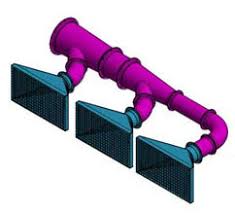
When the worker leaves this small protected space he will be donning an N95 mask but when in the protected space can be mask free. This market is evolving. There are well established cleanroom designs but the primary emphasis is on protecting the product. Protecting people with downward flow of purified air in the breathing zone is a different challenge. The class 100 cleanroom approach of HEPA filtered air at 100 fpm flowing downward in all parts of the room will be too expensive for a restaurant or meat packing plant. Providing this flow to just areas where there are stationary people will be cost effective.
The McIlvaine Coronavirus Technology Solutions with daily analysis of developments provides the basis for market strategy. McIlvaine also has forecasts on air filters, gas turbine intake systems, local air systems, dust collectors, and cleanrooms. These are described at www.mcilvainecompany.com
If you have questions or to discuss consulting services contact Bob McIlvaine at rmcilvaine@mcilvainecompany.com or 847 226 2391
Precision Textiles Expanding PPE Output
Six months ago, when Precision Textiles put a toe in the water to try its hand at producing personal protective equipment (PPE), the strategy was designed to keep its plant open and employees working. But the strategy has been so successful, that the leading supplier of coated fabrics, nonwovens and laminations for the bedding, automotive, healthcare and home furnishings industries has recently purchased additional manufacturing equipment to make the PPE line a permanent part of its product portfolio.
This recent investment includes six laminating machines dedicated to producing medical gown fabric, allowing Precision Textiles to produce an additional 1.5 million yards of domestically-sourced fabric each month. These additional machines have allowed the company to hire 25 new machine line operators and supervisors that will solely produce medical gown fabric.
“When the coronavirus pandemic erupted, we began manufacturing medical gown and mask fabrics in order for us to remain an essential business. We saw what our country needed, and we were able to respond quickly to this demand. We see now that PPE materials made domestically and are readily available to meet the needs of our customers are more important than ever, and we look forward to further expanding into this category,” says Scott Tesser, CEO of Precision Textiles.
During the initial outbreak, Precision Textiles’ 210,000-square-foot manufacturing facility became an essential business providing more than 28 million yards of PPE to hospitals, businesses and non-profit organizations to-date. Along with production, which was completed in the New Jersey factory, all the polyester staple film, TPU fiber and other materials used to make the fabrics were sourced domestically.
To continue making PPE domestically, Precision Textiles is committed to sourcing the necessary materials state-side, as well as bringing all PPE production to its U.S. facilities. This move will also create numerous of jobs within the industry.
“Over the course of my career, I watched how garment production slowly made its way overseas and never came back,” Tesser says. “I started in this business straight out of college; my father was in the apparel industry and my grandfather before him. I remember the days of garment racks being pushed down the streets and cutting rooms full of hustle. To me, it was what our country was built on. Hard work and labor. We were a country that made things"
“I was proud to be a part of that, and it’s time to bring manufacturing back to the United States. I don’t want to see our nation’s reliance on PPE in the hands of foreign manufacturers. We can and we will make it here,” he adds.
Ontex Making 80 Million Face Masks per Year in Belgian Factory
Ontex has unveiled a production line with a capacity of approximately 80 million face masks per year at its factory in Eeklo, Belgium where it has been producing one hundred thousand masks per day since August.
“We started producing face masks to help protect essential workers in hospitals and care homes, as well as our employees,” says Xavier Lambrecht, president of Ontex’s Healthcare Division. “Thanks to automation and more than 40 years of experience in personal hygiene, we can offer hospitals and care homes certified face masks at an attractive price.”
The new face mask production line was installed in only 100 days. The production line started making face masks in August and is scheduled to produce type 2R medical face masks as of October. Producing masks was Ontex’s own decision and the project does not benefit from any government funding.
The production line is located in Ontex’s plant for essential personal hygiene goods in Eeklo, Belgium and was officially inaugurated in the presence of Belgian government officials on September 22. Hilde Crevits, Flemish minister for Economy and Innovation said: “It is crucial that we establish here in Flanders and Belgium a strategic production of protective material. I am therefore proud and impressed by the work of Ontex’s engineers and technicians, building a fully functional and hygienic mass production line to meet an urgent need in society, in just 100 days. A perfect example of Flanders flexibility and strength.” Belgian Federal Minister Philippe De Backer, responsible for the sourcing of face masks during the COVID-19 crisis, said: “I hope millions of people in Belgium and across the world will be better protected thanks to the products made here in Belgium.”
The Ontex factory in Eeklo has over 40 years of experience in the production of personal hygiene products and received the ‘Factory of the Future’ title from Belgian technology association Agoria in 2019 and 2016. The factory employs 550 people and produces products for baby care, feminine care as well as face masks. Type 2R medical face masks with headbands, which create a barrier against tiny droplets and splashes, are typically used in challenging healthcare environments, such as surgery rooms.
In August and September, a first production run of face masks was produced for Ontex employees.
Private Equity Group Makes Offer for Ahlstrom Munksjo
A consortium of private equity interests including Bain Capital said on Thursday it was offering to buy nonwovens and specialty paper maker Ahlstrom-Munksjö Oyj in a deal valuing the Finnish firm at around €2.1 billion. The consortium, Spa Holdings 3 Oy, said it was offering €18.10 euros in cash per share, representing a premium of around 24% to Wednesday's closing price of €14.56 euros.
The bidder said it had received irrevocable undertakings to support the offer from shareholders representing over 35% of the shares, while the board of Ahlstrom-Munksjö is also recommending shareholders accept the offer.
The consortium said it intends to invest "significant time, resources and capital" to support Ahlstrom-Munksjö's strategy for long-term profitable growth.
"The completion of the tender offer is not expected to have any immediate material effects on the operations, or the position of the management or employees, of Ahlstrom-Munksjo," it said in a statement, adding it would change the composition of the board.
According to the Ahlstrom-Munksjö website, the Consortium believes that under private ownership Ahlstrom-Munksjö will be best placed to fulfill its potential from its diversified product portfolio, substantial technical know-how as well as its leading positions in attractive niches. However, the Consortium recognizes that the sector is becoming increasingly competitive and intends to invest significant time, resources and capital to support its strategy for long-term profitable growth, to maintain and further strengthen existing market positions in its core areas and invest in new business opportunities. Under private ownership, the company would be ideally positioned to invest further and faster in initiatives to support organic growth as well as benefiting from additional expansionary capital expenditures and acquisitions to strengthen selected areas of the portfolio.
The offer is expected to be officially submitted October 26 and the offer period will expire January 4, 2021.
Ortner Hygienic Cube Recommended for Meat Processing Plants
The hygiene cube, which can be placed freely in the hall and is equipped with HEPA filters and wide-throw nozzles, flushes the air in the hall using UVc radiation and a recirculating air volume of 3000 m3/h. The hygienic air cooler with its integrated filter stages with coarse filters and the built-in HEPA filter additionally creates approx. 4500 m3/h microbiologically clean air in the hall. Under these conditions, the hygiene requirements for the meat and delicatessen industry as well as for the milk processing industry are guaranteed.
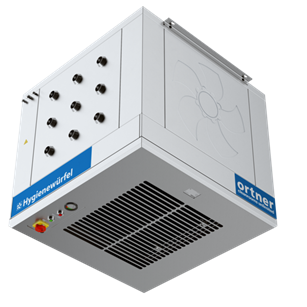
Ortner Decontamination of Hotel Rooms
The decontamination of hotel rooms with H2O2 is also possible and sensible. Without damaging furniture or equipment in the hotel room, decontamination is proactive against fungi, germs, bacteria or viruses. Due to the safe and environmentally friendly decomposition of the hydrogen peroxide, the hotel room can be rented out safely after six hours.
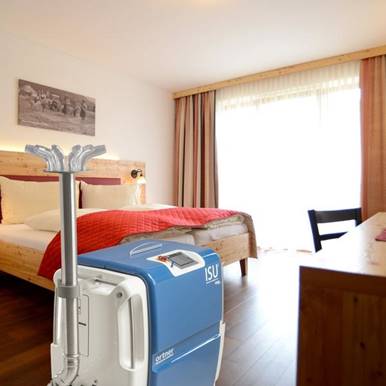
COVID Outbreak at Another Irish Meatpacking Plant
There has been a Covid-19 outbreak involving more than 20 cases in a meat processing plant in Co Waterford, according to trade union Siptu.
Greg Ennis, Siptu organizer for meat plant workers, confirmed he was aware of a “significant outbreak” in a Co Waterford plant run by Dawn Meats.
Mr Ennis, who said he was in contact with workers in the plant, said he understood the outbreak was connected to “20 to 30 cases”.
In response to queries on the outbreak from local TD David Cullinane, Minister for Health Stephen Donnelly confirmed a recent cluster linked to a workplace had resulted in 28 coronavirus cases, without identifying the premises.
In a statement, Dawn Meats declined to comment on the reports of an outbreak at the Co Waterford plant.
“We do not plan to publish updates or give commentary on test results at specific plants, where positive tests are identified we will ensure all staff, close contacts, and the HSE and relevant authorities are fully informed,” the statement said.
“Dawn Meats approach is that any staff member who may be obliged to self-isolate in line with HSE guidelines, will continue to be paid,” it said.
The company said all its facilities “undergo weekend deep cleaning as part of our Covid control program”.
Mr Ennis said he welcomed the fact workers who were required to self-isolate would continue to be paid.
The Siptu official criticized the lack of information provided on the outbreak by the company.
“There are restrictions from the meat plant in releasing information, and that’s not good enough,” he said.
A spokesman for the Health Service Executive (HSE) said it did not comment on individual outbreaks or clusters.
Serial testing of workers in meat plants was paused last week but has resumed again in recent days.
Mr Ennis said he was “extremely concerned” about the testing situation in meat plants, which had been shown to be “unprecedented vectors of the virus.” The union official said he welcomed the fact mass testing of plant workers had resumed this week.
Large outbreaks of the virus in food processing plants contributed to the decision to introduce local lockdowns in Kildare, Laois, and Offaly in early August.
In recent days the State’s acting chief medical officer, Dr Ronan Glynn said apart from Dublin, he was also concerned with increasing Covid-19 cases in a number of counties, including Waterford.
Speaking in the Dáil on Thursday, Sinn Féin deputy leader Pearse Doherty said the lack of information on the outbreak in Waterford and similar workplace clusters “is not good enough.” The Donegal TD called for the HSE to publish the details of clusters in workplaces.
Tánaiste and Minister for Enterprise Leo Varadkar said the HSE and the National Public Health Emergency Team (NPHET) “should be as transparent as possible in putting out details of where clusters are located”. However, he said that should not result in “stigmatizing people” or situations where individuals could be identified.
“If public health doctors and officials dealing with the cluster believe a place has an outbreak and should be closed, the Government supports any decision to close a business, meat plant, school or anything else if that is the right thing to do in public health terms,” Mr. Varadkar said.
